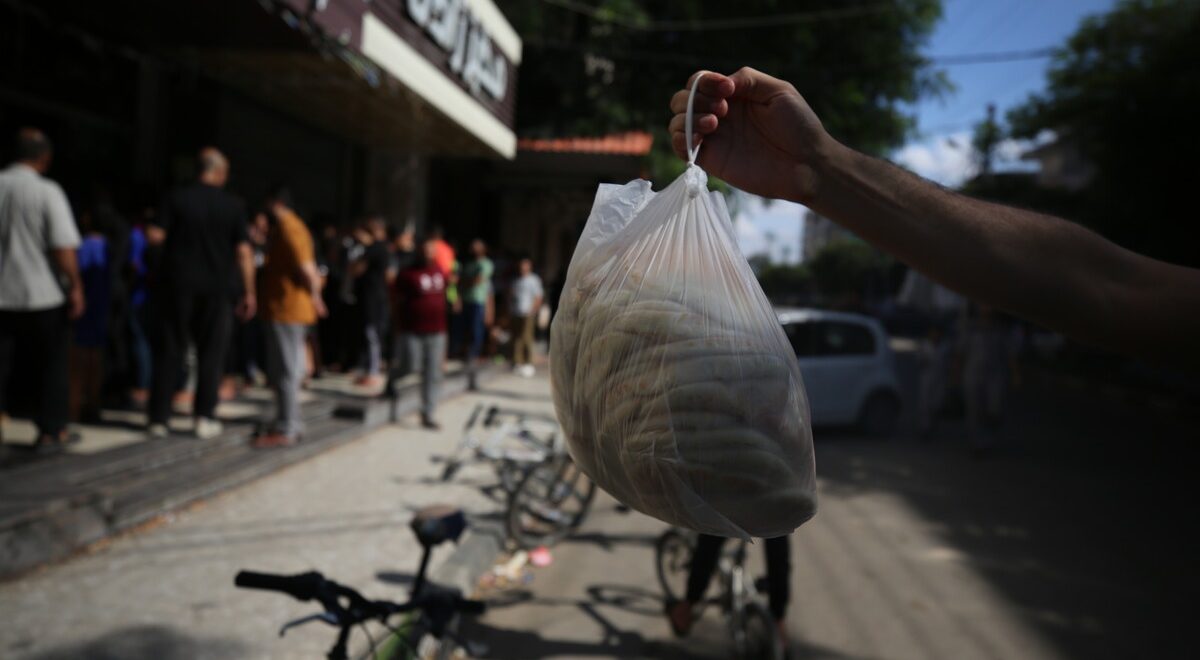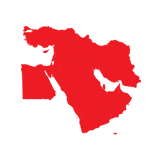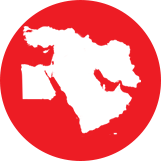As the pressure intensifies for residents in northern Gaza to relocate southward, millions of people are at risk of starvation, dehydration, and waterborne diseases due to depleting fuel reserves, which pose a severe threat to essential humanitarian operations.
Yesterday, UNRWA and OCHA announced that their last remaining fuel reservoir has been exhausted, further endangering the lives of over 2.3 million people across Gaza and accelerating a public health crisis to catastrophic proportions. The two remaining waste distribution plants in Gaza will cease functioning in the coming few hours, leaving people with no potable water and without functioning sewage removal services.
Faatinah*,whose name we have changed to protect her identity, is staying in a UN shelter in southern Gaza and told ActionAid about the dire conditions:
“The situation in the shelter here is a catastrophe and unbearable. The shelter is extremely crowded, with people coming from the northern Gaza Strip, Gaza City, also Al Zahra City, and in [Al] Mughraqa. Everyone has left everything behind due to the continuous bombings.”
She spoke about how the situation in shelters is particularly dangerous for children and those living with chronic diseases.
“People are suffering from a lack of proper sanitation facilities and hygiene supplies. There is no suitable sleeping accommodation or blankets. People are sleeping on the ground and under the open sky. There is a severe shortage of clean drinking water and basic human necessities. The needs here are extensive and urgent. A significant number of elderly people with chronic diseases, as well as people with disabilities, are living in conditions that are not suitable for these vulnerable groups.
Children make up a substantial portion of the population. They cannot sleep due to the relentless bombings.Many of them are suffering from severe post-traumatic stress disorder, and others are suffering from fever, diarrhea, and vomiting due to the lack of personal hygiene items and overcrowding, which is a breeding ground for epidemics and diseases.
Everything here requires a queue. You have to stand in a long queue to get your drinking water and your food. We long for a cup of boiled water to prepare tea or milk for our children. Thefuel is not sufficient, so power generators are run [just] for a few hours in the evening so that we can charge our phones, and we can barely access the internet. We feel like we are isolated from the world.”
Concerningly, this comes at a time when heavy rainfall and flooding are expected in Gaza over the next 24 hours, spiking the risk of waterborne diseases even further
Riham Jafari, Advocacy and Communication Coordinator ActionAid Palestine, said:
“For weeks, aid agencies have been imploring Israel to allow lifesaving fuel into Gaza – to keep hospitals and water and sewage plants running. And, despite dire warnings, our pleas have been completely ignored as Gaza stands on the brink of a rapidly escalating public health crisis. With heavy rainfall increasing flooding across Gaza, the risk of illness and deaths from waterborne diseases may skyrocket exponentially as shelters remain extremely overcrowded.”
Over 1.5 million people in Gaza are estimated to have been internally displaced since October 7, according to the UN, with over 200,000 people being forcibly displaced since November 5 alone. 760,000 Palestinians are currently staying in at least 149 UN shelters that are heavily overcrowded. In each shelter, there is an average of 6,250 people – nine times more than their capacity. For those sheltering in UN facilities in Gaza, an average of 160 people share one toilet, and 700 people share one shower. The consumption of water from unsafe water sources is increasing the risk of dehydration, with the WHO reporting last week that 33,500 cases of diarrhea have been reported, mostly among children under five over the last month alone – some 16 times the monthly average.
Yasmin*, whose name we changed to protect her identity, has been displaced multiple times with her family from her home in Beit Hanoun, northern Gaza. She spoke about the lack of clean water and sanitation in the shelters she’s stayed in.
“[We] went to [the] UNRWA school in Al-Nasr, very close to Al-Shifa Medical Complex. We spent about 20 or 25 days there. The situation was very, very bad. There was no water for drinking or bathing. In 38 [days], my children have not bathed [more than] once or twice. This means that the children suffer from diarrhea and are very tired. [They] have a fever and ear pain. There is no electricity, no water, no food, no drink, and not even a place to sleep like humans.”
Jafari warned that the crisis in southern Gaza is critical and threatens to plunge millions of people headlong into a public health crisis:
“We urge all parties to recognize and uphold their obligations under international law. These include the duty to ensure the provision of humanitarian assistance and the protection of the rights of civilians in conflict zones. The decision by the Government of Israel to withhold and restrict essentials like electricity, water, internet, phone connections, and, crucially, fuel, constitutes a violation of these obligations.
As Gaza faces a near-total depletion of fuel reserves, the international community must act collectively and decisively to ensure the uninterrupted flow of aid and the fuel required to deliver it, safeguarding the dignity and rights of all affected civilians before thousands more lives are lost to illness and disease.”
Faatinah* spoke about the lack of safety for people in Gaza wherever they turn and the need for an immediate ceasefire:
“What we are experiencing is a recurring nightmare every day. [There is] bombing everywhere around [the] UNRWA shelter, and many people were injured as a result of the intense shelling…[There are] no safe places. People here are enduring everything, and all they ask for is an immediate ceasefire because nothing is okay anymore.”
[ENDS]
For media requests, please email Christal.James@actionaid.org or call 704 665 9743.
Riham Jafari, Coordinator of Advocacy and Communication for ActionAid Palestine, is available as a spokesperson.
About ActionAid
ActionAid is a global federation working with more than 15 million people living in more than 40 of the world’s poorest countries. We want to see a just, fair, and sustainable world in which everybody enjoys the right to a life of dignity and freedom from poverty and oppression. We work to achieve social justice and gender equality and to eradicate poverty.


